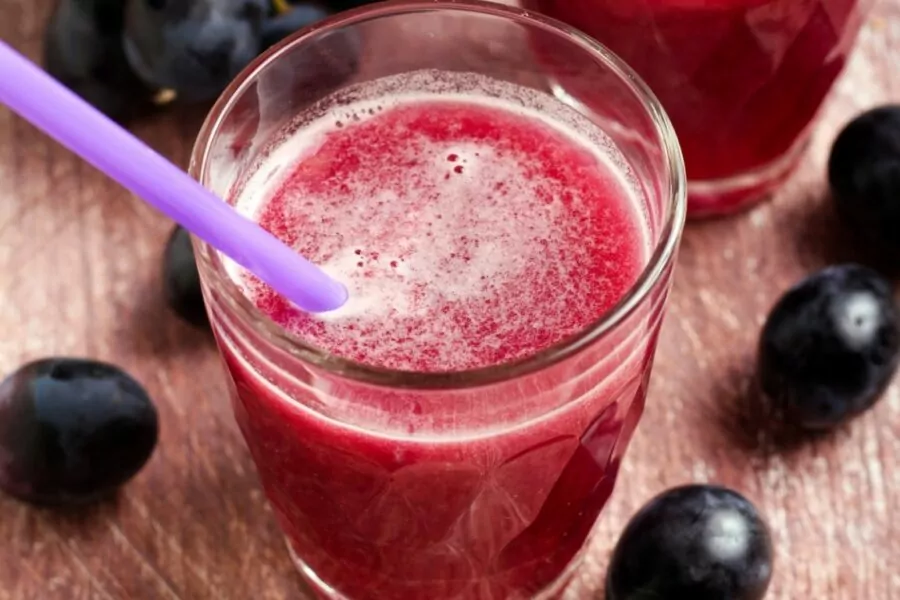Grape Juice Exploring its Nutritional Benefits and Caloric Content
Grape juice is a popular beverage made from the juice of fresh grapes. It is enjoyed by people of all ages, and it is a refreshing and delicious alternative to other sweet drinks. Grape juice can be found in various forms, including concentrated, frozen, or freshly squeezed. In this article, we will explore what grape juice is, specifically its nutritional benefits, and how many calories are in grape juice.

What is grape juice?
Grape juice is a liquid extracted from grapes by pressing them. It can be consumed as a standalone drink or used as a base for making other beverages such as wine. The juice is produced by removing the skins, stems, and seeds of the grapes, leaving only the pulp, which is then crushed and pressed to extract the juice. Grape juice is typically sweet, although the sweetness may vary based on the type of grapes used, the ripeness of the grapes, and whether any sugars have been added during the production process.
Grape juice is rich in nutrients and antioxidants, including vitamin C, potassium, and resveratrol. It is considered a healthy beverage choice due to its high nutritional content and lack of added preservatives or artificial flavors.
Summary:
- Grape juice is a liquid extracted from grapes by pressing them.
- It can be consumed as a standalone drink or used as a base for making other beverages such as wine.
- The sweetness of grape juice varies based on the type of grapes used and the ripeness of the grapes.
What are the nutritional benefits of grape juice?
Grape juice is rich in vitamins and minerals that are essential for good health. Here are some of the key nutrients found in grape juice:
Antioxidants
Grapes are rich in antioxidants, which help protect your cells from damage caused by free radicals. Free radicals are unstable molecules that can cause oxidative stress, leading to chronic diseases such as cancer, heart disease, and Alzheimer’s disease. The antioxidants found in grape juice include polyphenols, flavonoids, and resveratrol, which have been shown to have anti-inflammatory and anti-cancer properties.
Vitamin C
Grape juice is an excellent source of vitamin C, which plays a crucial role in maintaining a healthy immune system. Vitamin C also helps your body absorb iron from plant-based foods.
Potassium
Grape juice is a good source of potassium, which is vital for regulating blood pressure and maintaining a healthy heart. Potassium also helps support proper muscle and nerve function.
Iron
Grape juice contains a small amount of iron, which is essential for transporting oxygen throughout your body. Iron is also necessary for the production of red blood cells.
Summary:
- Grape juice contains antioxidants that protect cells from damage caused by free radicals.
- It is an excellent source of vitamin C, which supports a healthy immune system.
- The high potassium content of grape juice helps regulate blood pressure and maintain a healthy heart.
- Grape juice also contains iron, which is essential for transporting oxygen throughout the body.
How many calories are in grape juice?
The number of calories in grape juice depends on several factors, including the type of grapes used, whether any sugars or other sweeteners have been added during the production process, and how much juice you consume. Here are some general guidelines for the caloric content of grape juice:
- One cup of unsweetened grape juice contains around 150 calories.
- One cup of sweetened grape juice may contain up to 200 calories or more, depending on the amount of sugar added.
It is important to note that grape juice is relatively high in sugar, which can lead to weight gain and other health problems if consumed in excess. If you are watching your calorie intake, it is best to enjoy grape juice in moderation and opt for unsweetened varieties whenever possible.
Summary:
- One cup of unsweetened grape juice contains around 150 calories.
- One cup of sweetened grape juice may contain up to 200 calories or more, depending on the amount of sugar added.
- Grape juice is relatively high in sugar, so it should be consumed in moderation to avoid weight gain and other health problems.
Conclusion
Grape juice is a tasty and nutritious beverage that offers many health benefits. It is rich in antioxidants, vitamins, and minerals that help protect your cells from damage, boost your immune system, and support overall good health. However, it is important to be mindful of the caloric content of grape juice, especially if you are watching your weight. By enjoying grape juice in moderation and opting for unsweetened varieties whenever possible, you can reap its many benefits while still maintaining a healthy lifestyle.



 /*chức năng hoạt động của tab&slider trang chủ*/
/*chức năng hoạt động của tab&slider trang chủ*/